From Pulpit to Pandemic: How Historically Black Texas Churches Spread the Word on Vaccinations
By Cristela Jones
Reporting Texas
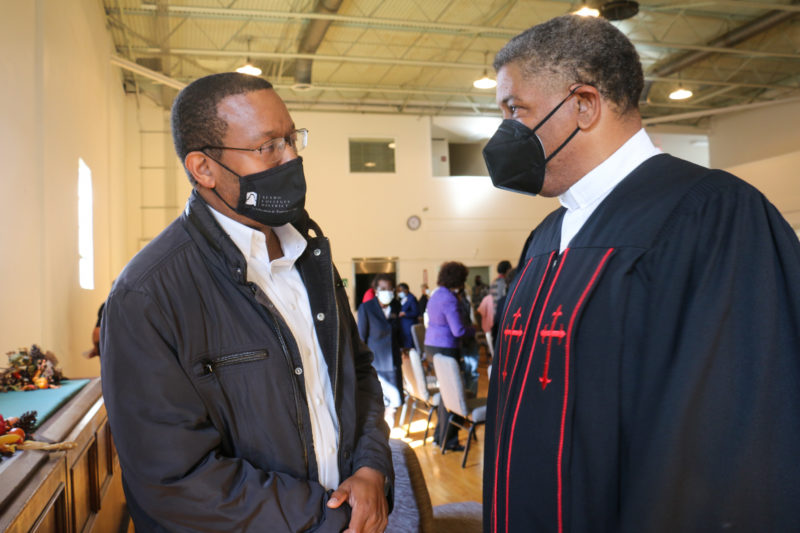
Oliver Jones, left, talks to the Rev. James Amerson after a Sunday service at St. Paul United Methodist Church in San Antonio on Nov. 14, 2021. Cristela Jones/Reporting Texas
For nearly a year, the Rev. Jimmy Hunter of Toliver Chapel Missionary Baptist Church in Waco preached his Sunday sermons in the church’s parking lot on a mechanical lift more commonly seen on construction sites. Depending on the weather, members of the church would hear the word of God from a folding chair or inside their cars with the windows down.
“Vehicle horns became the means by which they (bear) witness to the songs of praise and the Word of God preached,” Hunter said.
Among the praise, Hunter also announced the various ways in which Toliver Chapel’s predominantly Black congregation could get tested and vaccinated for COVID-19. Throughout the pandemic, the 126-year-old church hosted COVID-19 testing events that brought in more than 600 people across Waco. The church bought newspaper advertisements, created promotional Facebook posts and developed a phone tree system all to “help spread the news,” Hunter said.
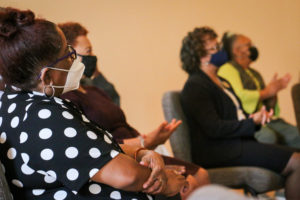
St. Paul United Methodist Church members listen and clap to the sermon during a Sunday service at the church in San Antonio on Nov. 14, 2021. Cristela Jones/Reporting Texas
As of October, only 10% of African-Americans in McLennan County were fully vaccinated, according to Lashonda Malrey-Horne, McLennan County health director.
Statewide, that number is much higher, with 41% of Black adults receiving at least one vaccine, but remains lower than for other ethnic groups. As of November, 67% of Asian adults, 52% of Hispanics and 49% of whites had received at least one vaccination.
In Texas, Black churches have been at the forefront of encouraging their congregations to get vaccinated and change the narrative for Black health. Religious institutions helped shape many Americans’ views on the COVID-19 pandemic, according to a study conducted by Pew Research Center. Historically Black Protestant church goers led the count with 64% saying their clergy encouraged them to get vaccinated, compared with 42% of Catholics and 21% of evangelicals.
“Unlike white evangelical churches and American Protestant churches, Black churches have had to multitask to be not only a place of worship, but also a place for civic work,” said Khytie Brown, a University of Texas assistant professor of African American religion.
Brown said historically Black churches in America play such a unique role because they were the “first initial founding institutions” for the Black community.
During the decades of slavery in America, many enslaved Africans found refuge in their faith and religious meetings that were closely monitored by white slave owners.
“A lot of Black people had these praise and worship houses, which were often one of the only times people were able to gather their community, organize and talk,” Brown said. “And that legacy still continues from Reconstruction to Jim Crow, the civil rights era and today.”
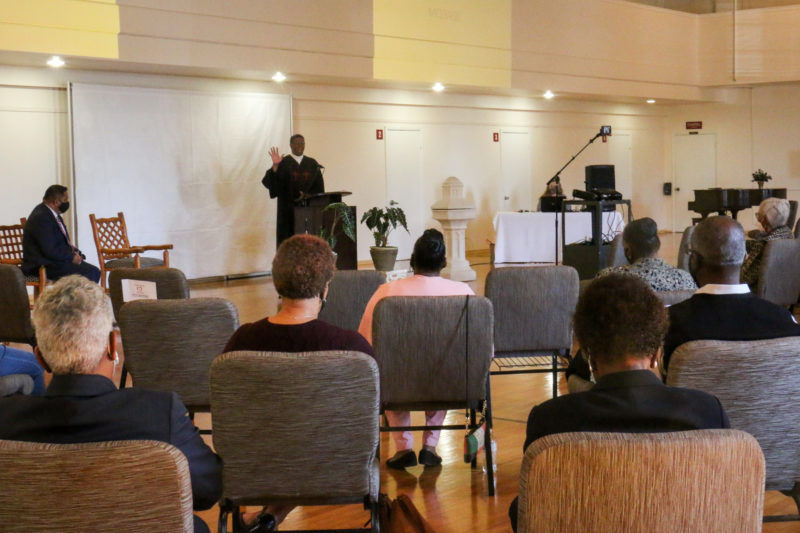
The Rev. James Amerson preaches to his predominately Black congregation at St. Paul United Methodist Church in San Antonio on Nov. 14, 2021. Cristela Jones/Reporting Texas
The Rev. James Amerson, pastor of St. Paul United Methodist Church in San Antonio, said that before he started talking about vaccines in church, he was discussing the murder of George Floyd by Minneapolis police in the early stages of the pandemic.
“As a pastor, I felt I was responsible for caring for the congregation even though we weren’t together physically,” Amerson said.
Amerson moved church services online in March 2020. At 155 years old, St. Paul is the oldest historically Black church in San Antonio, and Amerson said he hopes to preserve its legacy by limiting disparities in the church’s Eastside, majority low-income, Black community.
Last year, Amerson put together a church committee with the San Antonio health district and UT Health Science Center to review data for the city’s Eastside and keep their eyes open for any news about the COVID-19 vaccine.
“If somebody is going to be advocating for the Eastside and people of color, we needed to know what doctors in the city and the county were doing for the sake of being fair and just,” Amerson said.
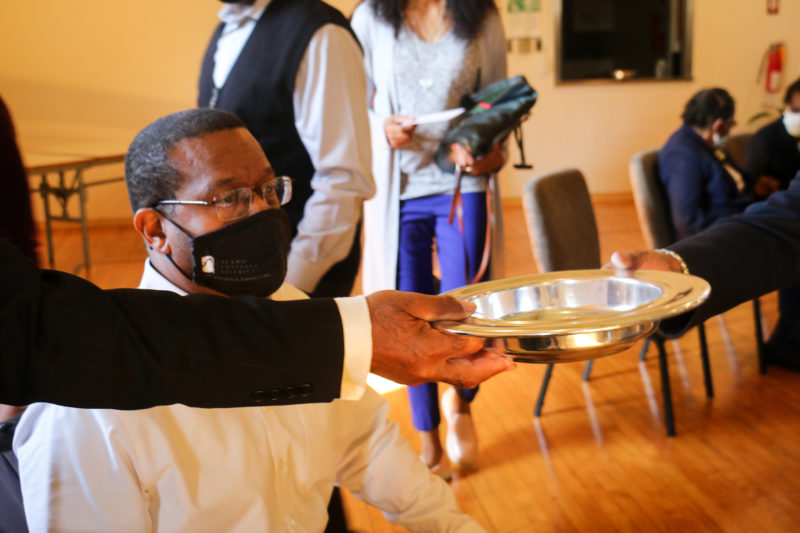
St. Paul United Methodist Church ushers pass the donations collection tray after the Sunday morning service in San Antonio on Nov. 14, 2021. To lower the risk of COVID-19 spread among elders at the church, ushers carry collection trays around the room in order to limit the number of people touching the tray. Cristela Jones/Reporting Texas
One member of the committee was Linda Waiters, a nurse in San Antonio and usher at St. Paul. She helped vaccinate nearly 99% of the church’s elders by informing them when and where to get vaccinated around the city.
“When I found out that anyone can get vaccinated, I went through the church directory, calling friends and family that I knew and I said, ‘Come on I’ll get you registered, so you can get your vaccine today,’ ” Waiters said. “My main focus were the elders, whether it was at my church or any other. It was the elders, and even now I’m still calling or when I see them. I let them know, ‘You need to get your booster shot.’”
The COVID-19 pandemic disproportionately has killed Blacks, Latinos and Native Americans, which accentuated health disparities among these communities in 2020, according to a study from the National Cancer Institute.
The Rev. Ralph Caraway Sr. from St. Louis Baptist Church in Tyler said he promoted vaccinations at his church because “too many Black and brown people were dying because of the effects of the pandemic.”
“You have to look at this more than just the spiritual wellbeing, but also the physical and mental wellbeing of the people, and to me it was important to reach out to any medical entity that could help us accomplish our objective biblically, and holistically to approach human beings,” Caraway said.
St. Louis had COVID-19 testing sites outside the church’s parking lot for months before vaccine shots were available in Tyler. In June, the Northeast Texas Public Health District partnered with St. Louis and other East Texas churches that serve minority populations to distribute vaccines on Sundays and Wednesdays at each church.
Caraway said he experienced firsthand the devastation the pandemic cost his predominantly Black church community, especially those who chose not to get vaccinated.
Some parishioners and members of St. Louis died of COVID-19 during the pandemic, which made Caraway want to advocate for the vaccine even more.
“Just recently, there was a situation where a mom and her daughter were in ICU at the same time,” Caraway said “And unfortunately, the daughter died. It was a situation where they had not been vaccinated.”
Vaccine hesitancy among Americans began even before vaccinations became available in the U.S. Distrust in government, conspiracy theories and potential risks from the vaccine are some of the main reasons that only 58.7% of Americans are fully vaccinated.
Suspicion of the vaccine among Black adults stems from a widespread mistrust of medicine that has plagued the advancement of Black health. Some point to medical abuse and racism in Black history, such as the Tuskegee Syphilis Study that unethically tracked the progression of syphilis in 600 poor Black men from 1932-1972.
“I understand in the Black community, there’s a whole lot of apprehension when it comes down to medical science based on some things that have happened in the past, but there’s nothing we can do to change the past, only the future,” Caraway said.
Malrey-Horne said because Black churches serve as an important source of information for the Black community, public health officials like herself will continue to work closely with them to help combat misinformation and spread the truth about health services.
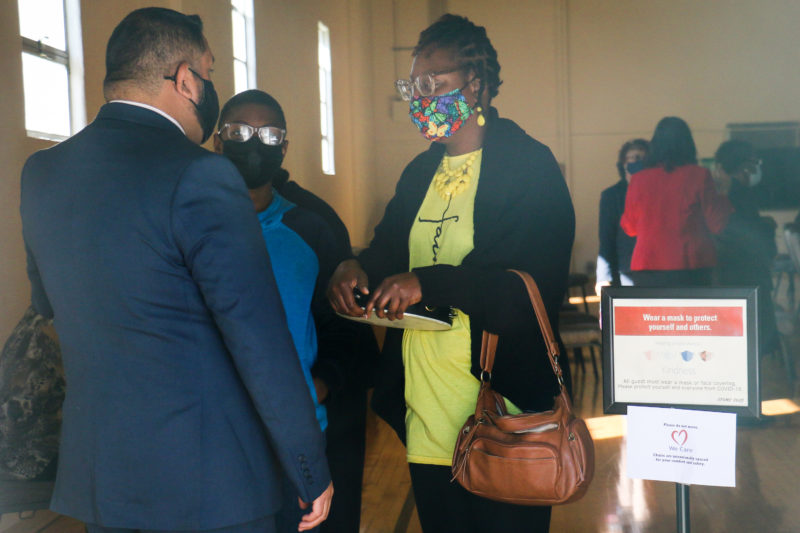
The Rev. Miguel Padilla, left, talks to Tyra Womble and her son Marcus Menefe after a Sunday service at St. Paul United Methodist Church in San Antonio on Nov. 14, 2021. Cristela Jones/Reporting Texas